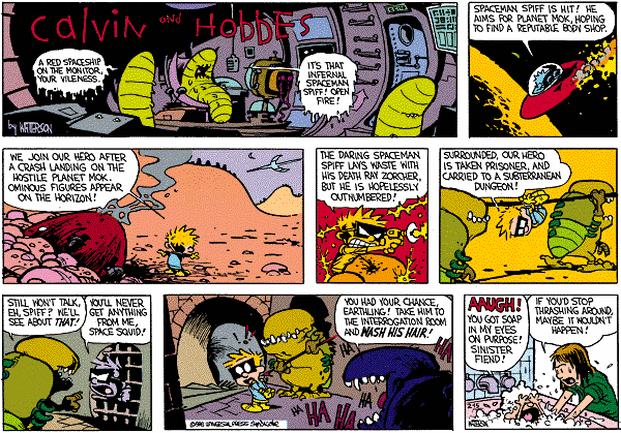Kritiks
Disclaimer: I want to first establish that I am in no way an expert on all things kritikal in policy debate. With that being said, everything on this page should be taken with a grain of salt. You can expect this page to be updated more frequently than other pages. My goal is to provide you with the most basic knowledge so that encountering the "big, scary kritik" is not as intimidating. At the end of the day, it's just another argument.
About Kritiks

First of all, what is a kritik?
A kritik, also commonly referred to as a "K," is a philosophical argument that challenges a mindset or assumption made by the opposing team. The argument generally targets one of the following: epistemology (the development of knowledge), methodology (the evaluation of methods), and ontology (the nature of being). As a result, kritiks are more heavily focused on assessing systems under which society operates (for example, economic systems like capitalism) and their impacts (for example, impacts like racism and dehumanization), rather than the pretend existential crises (like nuclear war and extinction) one traditionally uses when debating in policy.
Don't you mean "critique"?
The word "kritik" is actually the German word for the English "critique," sharing both the same meaning and the same pronunciation. While in practice, kritik and critique are one and the same (the K is essentially critiquing the opposing team's performance in round, right?), the difference between the two in the debate community helps differentiate between the argument used to win debate rounds (kritik) and the judge's remarks about both teams at the end of a round (critique).
A kritik, also commonly referred to as a "K," is a philosophical argument that challenges a mindset or assumption made by the opposing team. The argument generally targets one of the following: epistemology (the development of knowledge), methodology (the evaluation of methods), and ontology (the nature of being). As a result, kritiks are more heavily focused on assessing systems under which society operates (for example, economic systems like capitalism) and their impacts (for example, impacts like racism and dehumanization), rather than the pretend existential crises (like nuclear war and extinction) one traditionally uses when debating in policy.
Don't you mean "critique"?
The word "kritik" is actually the German word for the English "critique," sharing both the same meaning and the same pronunciation. While in practice, kritik and critique are one and the same (the K is essentially critiquing the opposing team's performance in round, right?), the difference between the two in the debate community helps differentiate between the argument used to win debate rounds (kritik) and the judge's remarks about both teams at the end of a round (critique).
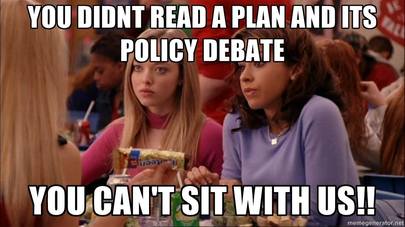
People say kritikal debate is too "progressive." What is the difference between "progressive" and "traditional" debate?
"Traditional" policy debate refers to the style of debating that is closer to what you imagine a debate round to be. This model of debate strictly sticks to the resolution and is much slower, generally putting a larger emphasis on speaking and presentation skills that are considered practical in the real world (read: not spreading, or talking ridiculously quickly). This type of debate is also usually very reliant on cards from sources that are considered credible from an academic perspective (traditional debaters may choose a piece of evidence from a professor at Harvard University about class inequality, rather than the shared personal experience of someone who lives in poverty). This is how policy debate started.
"Traditional" policy debate refers to the style of debating that is closer to what you imagine a debate round to be. This model of debate strictly sticks to the resolution and is much slower, generally putting a larger emphasis on speaking and presentation skills that are considered practical in the real world (read: not spreading, or talking ridiculously quickly). This type of debate is also usually very reliant on cards from sources that are considered credible from an academic perspective (traditional debaters may choose a piece of evidence from a professor at Harvard University about class inequality, rather than the shared personal experience of someone who lives in poverty). This is how policy debate started.
"Progressive" policy debate refers to the style of debating that has expanded upon the traditional model of debate. This includes spreading, or speaking super quickly during speeches, and using "non-traditional" evidence, like personal narratives and poetry and song, in addition to academic papers and studies. Kritikal debating is seen as "progressive," because kritiks provide an alternative way to view rounds; rather than looking at something from a pragmatic and strictly political perspective, kritiks allow students to view issues in a philosophical way, roleplay as something other than policy makers, and discuss important issues that preclude resolutional discussions.
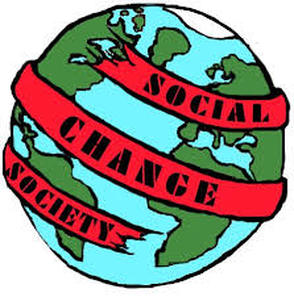
How Kritiks (Can) Change the Game
Whether you believe it or not, debate rounds provide a very unique space for students. It's one of the only activities where people are actually forced to listen to whatever you have to say, respond to what you have to say, and make informed decisions about what you said. As a result, many students have decided to use the debate space as a vehicle to start social change, sharing their own narratives and launching personal projects that may only slightly relate to or may even completely ignore the resolution. In this regard, kritikal debate has allowed for debaters to make the space whatever they want and talk about things they consider important in their every day lives.
Of course, you don't have to ignore the resolution or defy every rule of policy debate to run a kritik and recognize the educational value of a kritik. Since kritiks predominantly deal with systemic issues, kritikal debating allows students to critically analyze systems of power. Understanding these concepts can help make sense of current events on a local and global level, as well as give students the opportunity to form their own opinions about these events and speak out. Whether or not you like kritiks, a lot of kritikal literature deals with subjects that are extremely relevant, including activism for people of color, queers, women, etc.
Whether you believe it or not, debate rounds provide a very unique space for students. It's one of the only activities where people are actually forced to listen to whatever you have to say, respond to what you have to say, and make informed decisions about what you said. As a result, many students have decided to use the debate space as a vehicle to start social change, sharing their own narratives and launching personal projects that may only slightly relate to or may even completely ignore the resolution. In this regard, kritikal debate has allowed for debaters to make the space whatever they want and talk about things they consider important in their every day lives.
Of course, you don't have to ignore the resolution or defy every rule of policy debate to run a kritik and recognize the educational value of a kritik. Since kritiks predominantly deal with systemic issues, kritikal debating allows students to critically analyze systems of power. Understanding these concepts can help make sense of current events on a local and global level, as well as give students the opportunity to form their own opinions about these events and speak out. Whether or not you like kritiks, a lot of kritikal literature deals with subjects that are extremely relevant, including activism for people of color, queers, women, etc.
To simplify, I've identified three types of kritiks.
1. Kritiks of the Case
These kritiks point out problems in systems that the affirmative endorses in the "policy world," or the pretend world in which the affirmative's plan happens. For example, the 2014-2015 resolution was about ocean exploration and development. As one could imagine, fishing and fish farming became extremely popular topics in round; affirmatives would argue that using ocean animals for resources could do everything from helping solve food crises to finding cures for disease. However, the idea that humans can just use these animals for their own personal gain is anthropocentric. (Anthropocentrism, interchangeable with "humanocentrism," is the idea that humans are the most central species on the planet.) An anthropocentrism kritik may argue that the affirmative only appeals to the interest of humans which is harmful in the way that it establishes hierarchies that justify violence and subhumanization. Thus, even if the affirmative can technically find a cure for disease, it's not necessary a good thing because they're supporting a system that does bad things in order to find that cure. (Here's an example of an anthropocentrism kritik, and here's one about capitalism.)
These kritiks point out problems in systems that the affirmative endorses in the "policy world," or the pretend world in which the affirmative's plan happens. For example, the 2014-2015 resolution was about ocean exploration and development. As one could imagine, fishing and fish farming became extremely popular topics in round; affirmatives would argue that using ocean animals for resources could do everything from helping solve food crises to finding cures for disease. However, the idea that humans can just use these animals for their own personal gain is anthropocentric. (Anthropocentrism, interchangeable with "humanocentrism," is the idea that humans are the most central species on the planet.) An anthropocentrism kritik may argue that the affirmative only appeals to the interest of humans which is harmful in the way that it establishes hierarchies that justify violence and subhumanization. Thus, even if the affirmative can technically find a cure for disease, it's not necessary a good thing because they're supporting a system that does bad things in order to find that cure. (Here's an example of an anthropocentrism kritik, and here's one about capitalism.)

2. Kritiks of Presentation or Performance
These are kritiks that point out things that were problematic in the way the team presented their argument, typically regarding words used in round. This could be anything from using a piece of evidence that had ableist language in it (ex. "crippling debt"), or using gendered language while you're passing your flash drive to your opponents before your speech (ex. "Here you go, you guys!"). Rather than focusing on the pretend policy world where nuclear war happens without fail, these kritiks point out things that are happening in the actual round. The idea is that the team should lose because 1) the way they presented their argument was harmful in some way and 2) if that team loses because of it, they can change their strategy to make sure their presentation isn't harmful in the future. (Here is an example of a language kritik specific to the usage of the word "Islamophobia.")
These are kritiks that point out things that were problematic in the way the team presented their argument, typically regarding words used in round. This could be anything from using a piece of evidence that had ableist language in it (ex. "crippling debt"), or using gendered language while you're passing your flash drive to your opponents before your speech (ex. "Here you go, you guys!"). Rather than focusing on the pretend policy world where nuclear war happens without fail, these kritiks point out things that are happening in the actual round. The idea is that the team should lose because 1) the way they presented their argument was harmful in some way and 2) if that team loses because of it, they can change their strategy to make sure their presentation isn't harmful in the future. (Here is an example of a language kritik specific to the usage of the word "Islamophobia.")
3. Kritiks of Debate
Some kritiks shed light on problems regarding debate as an activity, which covers a broad range of things. Some of these kritiks point out how policy debaters have become increasingly encouraged to talk super quickly, which make it harder for students who have difficulties hearing or speaking. Others may point out a problem they see with the resolution. Some may shed light on problems happening in the debate community, such as male and female debaters being treated unfairly. These kritiks may argue that it's more important to talk about these issues than it is to talk about affirming or negating the resolution, because bettering the debate space is necessary to have a safer environment to have "regular" policy debates.
Some kritiks shed light on problems regarding debate as an activity, which covers a broad range of things. Some of these kritiks point out how policy debaters have become increasingly encouraged to talk super quickly, which make it harder for students who have difficulties hearing or speaking. Others may point out a problem they see with the resolution. Some may shed light on problems happening in the debate community, such as male and female debaters being treated unfairly. These kritiks may argue that it's more important to talk about these issues than it is to talk about affirming or negating the resolution, because bettering the debate space is necessary to have a safer environment to have "regular" policy debates.
Parts of a Kritik
There are three parts to a kritik:
The Link
This link is a piece of evidence or merely a statement explaining what the opposing team did. It can actually be as simple as saying, "The aff/neg team said/did X." Kritik links vary from things endorsed in the case or speech (ex. "They read a hegemony advantage!") or things said or done in round (ex. "They said 'you guys' to us during cross-ex!").
The Impact
The impact is the reason why what the opposing team did is a bad thing. So what, they read a hegemony advantage? Well, hegemony is harmful, because of X, Y, and Z. So what, they said "you guys" in round? Well, gendered language is harmful, because of X, Y, and Z. These are the equivalent of nuclear war scenarios and extinction claims so commonly made in regular disadvantages.
The Alternative
The alternative is a way to solve for the harm that the opposing team has made because of their previously stated link and impact. Generally, it is usually something as simple as, "Reject this way of thinking," while other alts may be actual actions like performing a "thought experiment," or promoting a different impact framing, or using non-traditional evidence like song and poetry.
In many ways, you can think of the link and impact as a disadvantage and the alternative as a counterplan. The link and the impact is a reason why the case or the opposing team is bad, and the alternative is the way to solve that bad thing.
The Link
This link is a piece of evidence or merely a statement explaining what the opposing team did. It can actually be as simple as saying, "The aff/neg team said/did X." Kritik links vary from things endorsed in the case or speech (ex. "They read a hegemony advantage!") or things said or done in round (ex. "They said 'you guys' to us during cross-ex!").
The Impact
The impact is the reason why what the opposing team did is a bad thing. So what, they read a hegemony advantage? Well, hegemony is harmful, because of X, Y, and Z. So what, they said "you guys" in round? Well, gendered language is harmful, because of X, Y, and Z. These are the equivalent of nuclear war scenarios and extinction claims so commonly made in regular disadvantages.
The Alternative
The alternative is a way to solve for the harm that the opposing team has made because of their previously stated link and impact. Generally, it is usually something as simple as, "Reject this way of thinking," while other alts may be actual actions like performing a "thought experiment," or promoting a different impact framing, or using non-traditional evidence like song and poetry.
In many ways, you can think of the link and impact as a disadvantage and the alternative as a counterplan. The link and the impact is a reason why the case or the opposing team is bad, and the alternative is the way to solve that bad thing.
How to Answer Kritiks
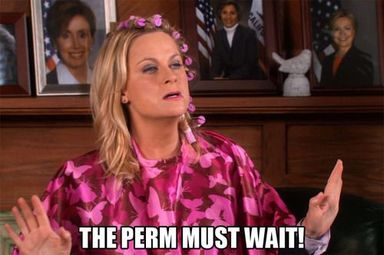 When Ann's away, the mice get perms.
When Ann's away, the mice get perms.
Considering that the kritik is essentially a disadvantage/counterplan combination, we can use many of the same arguments that we do against disadvantages and counterplans to answer kritiks:
1. Perm (as you would a counterplan)
When you perm a counterplan, the affirmative is arguing that you can take two courses of action at the same time in some way, which means that the negative team has failed to be competitive and that the affirmative plan can still be apart of the best policy option, and thus, the affirmative should win the argument. (For a more in-depth explanation, check out our counterplan page.)
Perming a kritik is similar in the way that you are advocating for two proposals to happen at once, but instead of taking two different courses of action in the fake policy world (ex. "We can curtail surveillance AND lift the Cuban embargo!"), the perm argues that you can do a pretend or real course of action while doing all or part of the alternative that the opposing team has introduced (which more often than not, involves a change of mindset). An example of a perm may be, "We can do the plan AND reject capitalism."
1. Perm (as you would a counterplan)
When you perm a counterplan, the affirmative is arguing that you can take two courses of action at the same time in some way, which means that the negative team has failed to be competitive and that the affirmative plan can still be apart of the best policy option, and thus, the affirmative should win the argument. (For a more in-depth explanation, check out our counterplan page.)
Perming a kritik is similar in the way that you are advocating for two proposals to happen at once, but instead of taking two different courses of action in the fake policy world (ex. "We can curtail surveillance AND lift the Cuban embargo!"), the perm argues that you can do a pretend or real course of action while doing all or part of the alternative that the opposing team has introduced (which more often than not, involves a change of mindset). An example of a perm may be, "We can do the plan AND reject capitalism."
2. No Link (as you would a disadvantage)
Remember, the link is the part of the argument that points out exactly what the opposing team did wrong. If there is no link, then the team that supposedly did something bad can't actually trigger the impacts of that bad thing. (Think about it like this: I LOVE eating ice cream, and I can't control myself so I end up eating massive amounts. That's the link. The impact is that I gain weight. Well, if I don't eat massive amounts of ice cream, I can't gain weight from it. There is no link, so the impact can't happen.) Basically, the "no link" argument states that you aren't actually doing what the other team is accusing you of doing.
Remember, the link is the part of the argument that points out exactly what the opposing team did wrong. If there is no link, then the team that supposedly did something bad can't actually trigger the impacts of that bad thing. (Think about it like this: I LOVE eating ice cream, and I can't control myself so I end up eating massive amounts. That's the link. The impact is that I gain weight. Well, if I don't eat massive amounts of ice cream, I can't gain weight from it. There is no link, so the impact can't happen.) Basically, the "no link" argument states that you aren't actually doing what the other team is accusing you of doing.
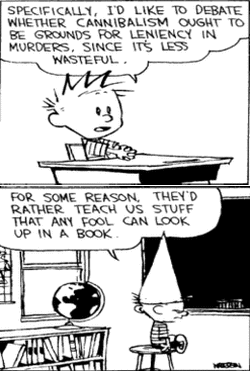
3. Link Turn OR Impact Turn (as you would a disadvantage)
A link turn argues that the plan actually solves the impacts of the kritik. An impact turn argues that the impacts that the kritik outlines are actually good things, instead of bad things.
Let's consider this in the terms of a disadvantage: The negative argues that the affirmative plan does something that contributes to global warming. The affirmative could either make a link turn and say that their plan actually solves global warming, or they could make an impact turn and say that global warming is good in some way.
There are two things to keep in mind:
1) Do not make a link turn AND an impact turn. You can only choose one, because if you make both, you are essentially saying, "The impact is a good thing, but we avoid the impact."
2) When dealing with kritikal arguments, you should use your best moral judgement to decide when it's appropriate to make an impact turn. For example, if the kritik has a racism impact, you really shouldn't make an impact turn and claim that racism is good.
4. Alt Can't Solve (as you would a counterplan)
Again, think of the alternative in terms of a counterplan. A counterplan is supposed to solve for the disadvantage; an alternative is supposed to solve for the kritik. When a team brings up an alternative, the team is essentially saying, "Not only has the other team done something bad, but you should vote for us, because we know how to solve it." But if you can prove that the alternative doesn't solve for the kritik, you can make the point that the plan or course of action that you are advocating for is at least less problematic than the status quo.
A link turn argues that the plan actually solves the impacts of the kritik. An impact turn argues that the impacts that the kritik outlines are actually good things, instead of bad things.
Let's consider this in the terms of a disadvantage: The negative argues that the affirmative plan does something that contributes to global warming. The affirmative could either make a link turn and say that their plan actually solves global warming, or they could make an impact turn and say that global warming is good in some way.
There are two things to keep in mind:
1) Do not make a link turn AND an impact turn. You can only choose one, because if you make both, you are essentially saying, "The impact is a good thing, but we avoid the impact."
2) When dealing with kritikal arguments, you should use your best moral judgement to decide when it's appropriate to make an impact turn. For example, if the kritik has a racism impact, you really shouldn't make an impact turn and claim that racism is good.
4. Alt Can't Solve (as you would a counterplan)
Again, think of the alternative in terms of a counterplan. A counterplan is supposed to solve for the disadvantage; an alternative is supposed to solve for the kritik. When a team brings up an alternative, the team is essentially saying, "Not only has the other team done something bad, but you should vote for us, because we know how to solve it." But if you can prove that the alternative doesn't solve for the kritik, you can make the point that the plan or course of action that you are advocating for is at least less problematic than the status quo.
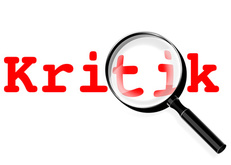
5. Impact Defense (as you would a disadvantage)
Impact defense is an argument that goes along the lines of, "If my opponents' statements were true, we would already be feeling the impacts of the kritik" or, "The impact won't happen at all." This is the kind of argument that you may not be able to do with every kritik since, as I've mentioned before, kritiks deal with systemic impacts that are already happening.
6. Kritik the Kritik (similar to presenting disadvantages to the counterplan)
Many times, you will be able to read kritiks about the kritik. For example, maybe the kritik uses problematic language. Maybe the kritik's authors are terrible people. Either way, if you can show that the kritik is problematic in its own way, you can win the kritik debate by persuading the judge that the kritik is not a "noble cause" to vote for.
Impact defense is an argument that goes along the lines of, "If my opponents' statements were true, we would already be feeling the impacts of the kritik" or, "The impact won't happen at all." This is the kind of argument that you may not be able to do with every kritik since, as I've mentioned before, kritiks deal with systemic impacts that are already happening.
6. Kritik the Kritik (similar to presenting disadvantages to the counterplan)
Many times, you will be able to read kritiks about the kritik. For example, maybe the kritik uses problematic language. Maybe the kritik's authors are terrible people. Either way, if you can show that the kritik is problematic in its own way, you can win the kritik debate by persuading the judge that the kritik is not a "noble cause" to vote for.
